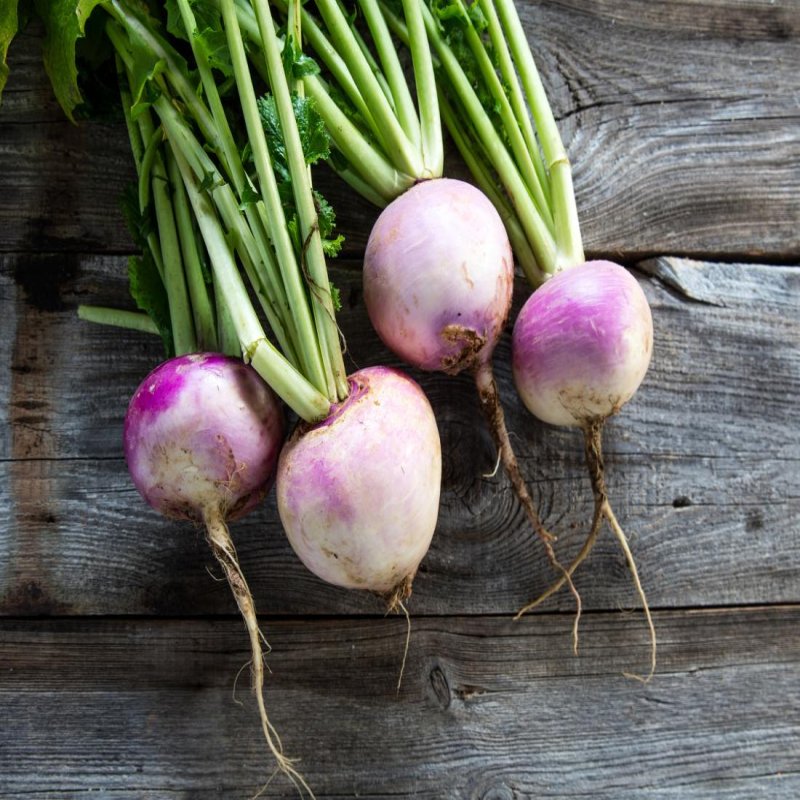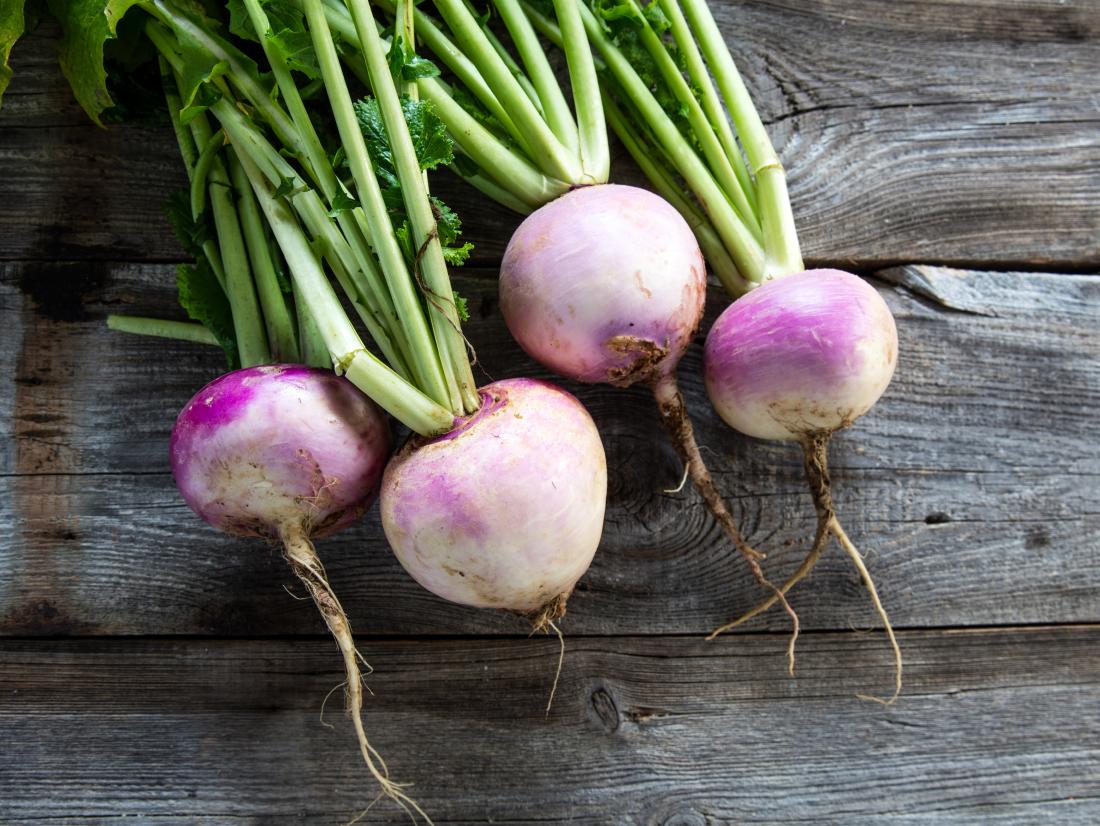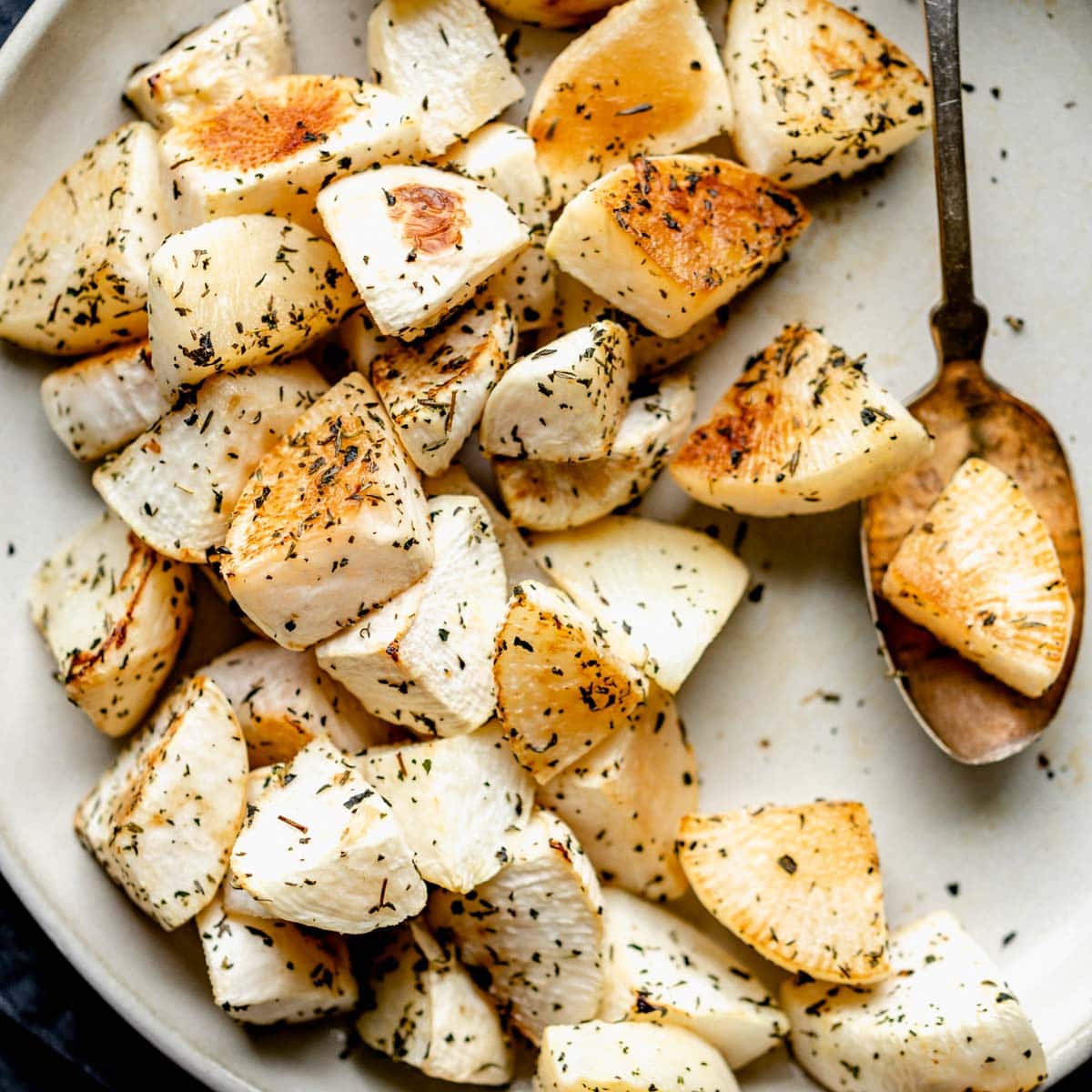
Turnips are crunchier than potatoes and starchier than radishes, making them one of the healthiest vegetables. Though it’s often mistaken for a member of the root family, the turnip belongs to the Brassicaceae family, which also includes cabbage, kale, Brussels sprouts, broccoli, etc. Today, turnips are widely enjoyed in a variety of dishes and have a high nutritional value.
Read on to know about the health benefits of turnips!
A turnip is a white-skinned root vegetable popular for both human consumption and livestock feed. Turnips are commonly grown in temperate areas across the globe and are cultivated for their nutritional value and taste of the root.

Turnips have been an important part of the human diet for over two thousand years. Countries from Brazil, England, and Japan to Iran, the United States, and Norway all have their own culinary takes on turnips and have made them a mainstay in their cultural meals for centuries.
Turnips are locally known as ‘Shalgam’ in Hindi and also Punjabi, ‘Tella Dumpa’ in Telugu, ‘Knol Khol’ in Tamil, ‘Madhura Mullangi’ in Malayalam, ‘Navil Kosu’ in Kannada, ‘Salgam’ in Marathi, and ‘Shalgom’ in Bengali.
_1729504225.jpg)
Turnips thrive best in cold weather and grow up to two feet high with long, slender, hairy leaves. You can buy them all year, but they taste best in the fall and spring when they are small and sweet. The small, young, and all-white baby turnips are harvested early in the growing stage. These are a favorite among many due to their sweet flavor and texture. You can add raw baby turnips to vegetable salads.
– Turnip juice is actually effective in warding off body odor.
– Roman author and philosopher Pliny the Elder described the turnip as “one of the most important vegetables” of his time.
– During the Middle Ages, the turnip was a popular vegetable often eaten by the lower economic class.
– The older and bigger the turnip gets, the blander its taste is.
The leafy green tops of turnips are more nutritionally dense than the crunchy white bulbous roots. They are rich in antioxidants like vitamins A and C, carotenoids, and lutein.
The leaves are also an excellent source of vitamin K, a direct regulator of the inflammatory response, and omega-3 fatty acids like Alpha-Linolenic Acid (ALA), which are the building blocks for your body’s anti-inflammatory molecules.
Health Benefits of Turnips
Turnips are a great source of minerals, antioxidants, and dietary fibers. It is also a low-calorie vegetable; a 100-gram serving only has 28 calories. Surprisingly, it’s also rich in immune-boosting vitamin C. Vitamin C aids collagen synthesis and promotes free radical scavenging, which helps reduce oxidative stress. Turnip greens also contain B vitamins, calcium, copper, manganese, and iron, as well as phytonutrients that help lower your risk of oxidative stress.
Turnips help prevent cancer, improve bone health, and maintain heart health. They also reduce inflammation and optimize digestion. Additionally, turnips regulate metabolism, increase circulation, and boost the immune system.
Fights Cancer
Aside from vitamin C, turnips provide considerable levels of vitamin E, manganese, and beta-carotene, all of which function as antioxidants in the body. These antioxidants seek out and neutralize free radicals. Free radicals may cause DNA damage which over a long period can increase your risk of cancer. Antioxidants found in turnips prevent chronic health conditions over the long term.

Maintains Heart Health
Excess free radicals in the body lead to oxidation of LDL-c (low-density lipoprotein cholesterol) and platelet clumping. This causes atherosclerosis, a condition that damages the blood vessels. Vitamins E, C, and beta-carotene in turnips are excellent antioxidants that fight free radicals in the body.
_1729504640.jpeg)
Turnips also contain potassium, which acts as a vasodilator, which reduces the strain on the blood vessels and arteries by lowering blood pressure. Thus, regular consumption of turnips helps prevent the development and progression of atherosclerosis as well as heart attacks and strokes.
Supports Bone Health
Calcium present in turnips can aid in the growth and repair of bone matter throughout our body. It helps in boosting bone mineral density, especially as you grow older and begin to suffer from arthritis and osteoporosis. Thus, include turnips and other calcium-rich foods in your diet to prevent bone disorders!
_1729504685.avif)
Improves Digestion
Dietary fiber plays an important role in the digestive process of our body. The high fiber content in turnip greens may prevent constipation and promote regularity for a healthy digestive tract. It can also help reduce symptoms of diarrhea, cramping, and bloating, as well as gastric issues.
_1729504531.jpeg)
Aids Weight Loss
Being low in calories can be an integral part of your weight-loss diet. The high fiber content of the vegetable enhances a healthy metabolism, maintains a healthy weight, and keeps you fuller for longer.

How to include Turnip in your Diet?
You can enjoy turnips in a variety of ways, both raw and cooked. You can chop, slice, dice, or keep them whole, depending on their size and the cooking technique. One must ensure not to overcook them in order to retain their crunchy texture. You can cook them in different ways, like baking, boiling, sautéing, or steaming.
Before cooking turnips, you must wash them under running water and scrub them thoroughly with a brush to remove any dirt or fungicide residues. Peeling them and cutting away their greens is optional.

You can cook turnips in many ways and add it to soups and salads, among other recipes.
Let’s look at a few ways to serve them:
- Salads: Young or baby turnips are a great addition to salads, as they are delicate and sweet. They make an excellent ingredient when you add them raw in a vegetable salad along with cabbage, carrot, and beetroot.
- Stew: When diced into cubes, turnips can be a great addition to a piping-hot vegetable stew. In fact, you can use turnip greens along with other vegetables and greens to cook various soups and curries.
- Pickle: In many parts of Iran, India, and Pakistan, people eat pickled turnips, just like other vegetables such as carrots, radish, and chili peppers.
Now that you know about the amazing health benefits of turnips, make sure to add them to your diet once in a while. How do you like eating turnips? Let us know in the comments below.
Disclaimer– Like other cruciferous vegetables, some of the compounds present in turnips can affect the thyroid gland and the production of thyroid hormones. Eat turnips in moderation if you’re suffering from any thyroid disorder.
Nutritional Information
100g of turnip provides 28 Calories, Carbs – 6.4g (Dietary Fiber – 1.8g, Sugar – 3.8g), Protein – 0.9g, Fat – 0.1g, Sodium – 67mg
And a percentage daily value of Vitamin A – 0%, Vitamin C – 35%, Iron – 2%, Calcium – 3% (based on a 2000-calorie diet).


.png)


